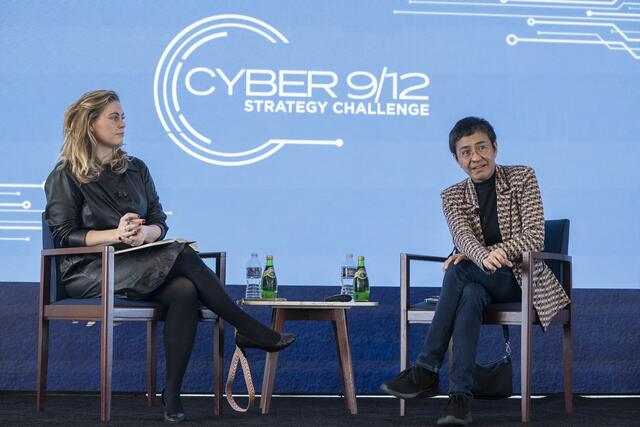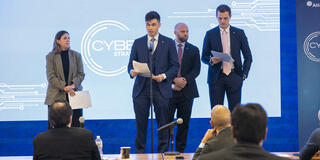
SIPA Student Team Wins Cyber 9/12 Strategy Challenge

SIPA students Olivia Adams MIA ’24, Seamus Boyle MIA ’24, Aaron Gurley MPA ’24, and Gunnar Wainwright MIA ’24 were the winners of this year’s NYC Cyber 9/12 Strategy Challenge. The Atlantic Council and SIPA’s Digital and Cyber Group (DCG) hosted the event at IAB on October 13 and 14. The first-place team was coached by Professor Erica Lonergan.
Professor Jason Healey, who established the competition in 2012, said it helps students understand “how national and other senior decisionmakers should respond to fast-moving cyber crises.”
More than 5,000 students have participated in the Challenge since its inception, Healey said. He noted that it was the first major cyber competition that spotlighted policy and enabled students to show “off their understanding of cyber conflict, international law, diplomacy, and cybersecurity.”
The event also provided “an opportunity to work with some truly great mentors and teammates,” said Gurley, who was part of the winning team.
Each of the 20 participating teams — including four from different Columbia schools and representatives of universities like the US Military Academy and Georgetown — responded to a fictional cyber attack against a Philippine telecommunications company. As usual, the scenario spanned three rounds, escalating along the way. Competition organizers hinted that patriotic Chinese hackers may have staged the attack in retaliation for the death of several Chinese crew members during a collision with the Philippine Coast Guard. In the final round, a US-based company helping the Philippines was attacked, which heavily impacted the United States.
More than 5,000 students have participated in the Cyber 9/12 Challenge since the inaugural competition in 2012.
The winning team drew on diverse backgrounds that included military service and cyber security. Members chose Lonergan as a coach based on her experience coaching Cyber 9/12 teams in the past.
“She told us all about what was needed to win,” Boyle said. “I would say the best thing we learned from her is that there’s no one-to-one policy response to any event or type of event, so a hack on US infrastructure doesn’t automatically ‘trigger’ a hack-back or military action. It’s all contextual.”
Boyle and Gurley said their team’s ultimate victory came as a surprise. “When they announced the results, and they walked across the stage to give second place to West Point, our jaws dropped,” Boyle said.
He expressed gratitude to Lonergan, his teammates, DCG, and the SIPA Cyber program.
Healey observed that competition alumni have gone on to work at the White House and in other diverse positions within the US government.
“AI and the cloud will continue to transform cybersecurity,” Healey said. “Students have a great advantage here as they will hopefully have used these tools during their time [at SIPA], and made the most of the opportunity to learn as much as possible before joining the workforce.”

The event also featured a fireside chat with Maria Ressa — the 2021 Nobel Peace Prize winner who is currently one of the Inaugural Carnegie Distinguished Fellows at SIPA’s Institute of Global Politics — in conversation with Camille François MIA ’13, a lecturer and senior researcher at SIPA who is collaborating with Ressa on an innovation lab on artificial intelligence. Ressa recounted a story about a friend’s kidnapping to emphasize the importance of people’s trust in information ecosystems. She said that local organizations like religious institutions and community groups can boost people's confidence in information systems by disseminating accurate news. Ressa also expressed her optimism about the next generation’s ability to combat disinformation.